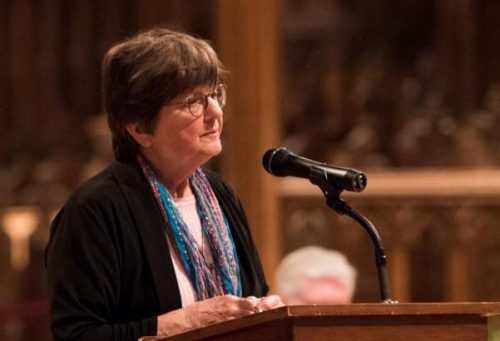WASHINGTON (CNS) — The statement “preaching to the choir” had double meaning Feb. 6 at the Washington National Cathedral where religious leaders spoke against the death penalty and members of the Washington National Opera sang arias from the “Dead Man Walking” opera.
The discussion, interspersed with song, was meant to highlight the upcoming opera at Washington’s Kennedy Center of Sister Helen Prejean’s 1993 book of the same name telling the story of her role as spiritual adviser to an inmate on Louisiana’s death row. The book was made into a movie two years later starring Susan Sarandon and Sean Penn.
“The opera takes you on a spiritual journey,” said Sister Prejean, a Sister of St. Joseph of Medaille, adding that it “brings us to places we’ll never go.”

She hopes the experience will not just move audiences in the moment but also stir them to do more.
“In prayer, you can work out what it is we are called to do,” she said.
Ever since her own experience in the early 1980s as a spiritual adviser to a death-row inmate who was executed, Sister Prejean has dedicated her life to advocating against capital punishment. She told the crowd of about 500 people at the cathedral that the first execution she witnessed changed her life forever.
She also promised the crowd that the opera’s recounting of that experience would change them.
The opera, which will have six performances in Washington between Feb. 25-March 11, first opened at the San Francisco Opera in 2000 and has played at multiple theaters worldwide since. Promoting the show is just one part of Sister Prejean’s ongoing effort to reach the public with her anti-death penalty message.
She gives plenty of talks on the issue throughout the year and for several years she has been working on the book “River of Fire: My Spiritual Journey to Death Row,” which she described as a prequel to “Dead Man Walking.”
At the Washington National Cathedral event sponsored by the Catholic Mobilizing Network to End the Death Penalty, Sister Prejean was joined by a diverse group of religious leaders who shared her opposition to the death penalty, a view they said they reached from their own faith traditions and sacred texts.
The leaders, representing Jewish, Hindu, Muslim, Pentecostal, Episcopal and Catholic traditions, not only spoke about the need to forgive and treat people with dignity but they also urged the audience to take necessary steps to end the death penalty.
“We have to evangelize our friends on this,” said Bishop Frank J. Dewane of Venice, Florida, who is chairman of the U.S. Conference of Catholic Bishops’ Committee on Domestic Justice and Human Development. He said people need to recognize that God’s justice and mercy are not contradictory but they work together.
The bishop said he came about his views against the death penalty simply from being raised on a dairy farm in Wisconsin “where you quickly learn the value of God’s creation.”
Episcopal Bishop Mariann Budde of Washington said the “closer you get to the death penalty the easier it is to be against it,” especially when considering questions like: “Do we have a right to kill?”
She said “Jesus is pretty clear” on this with his “unflinching call for mercy and forgiveness.”
Rabbi Hannah Goldstein, associate rabbi at Temple Sinai in Washington, also echoed the link between God’s justice and mercy, saying: “Justice is the belief that people can change, it is a form of mercy. God is where justice and mercy meet.”

In a question-and-answer session, moderator E.J. Dionne, syndicated columnist and Georgetown University professor, asked panel members how they would respond to victims’ families who are looking for vengeance or closure.
Sister Prejean said there is nothing to say to them directly but what she tries to do is acknowledge that they are experiencing pain that she can’t even imagine and she tells them she is there to accompany them.
Imam Yahya Hendi, Muslim chaplain at Georgetown University, also stressed the need to acknowledge family members’ pain. Dr. Uma Mysorekar, a medical doctor and president of the Hindu Temple Society of North America, said the death penalty fails to bring family members the closure they often seek.
“They will carry this with them for the rest of their lives,” she said of executions.
Sister Prejean is convinced people will only change their mind about the issue as they learn more.
“We need to think deeply about it,” she said.
She closed the presentation with a reading from the Book of Deuteronomy: “I have set before you life and death, the blessing and the curse. Choose life, then, that you and your descendants may live.”
“And go to the opera,” she added, parting from the Bible passage.






















